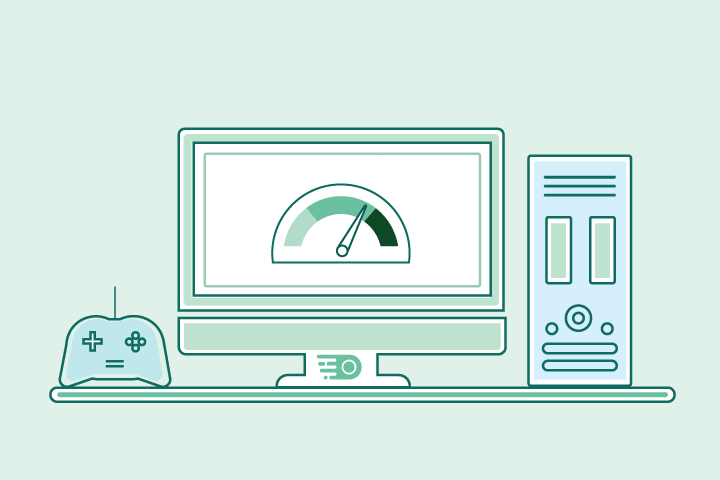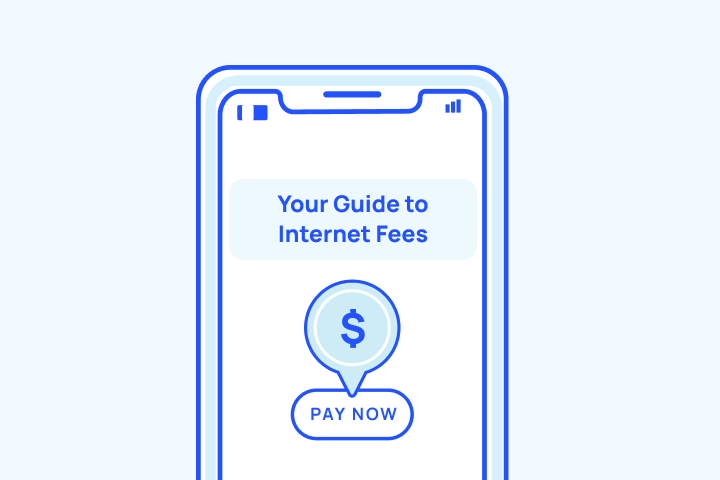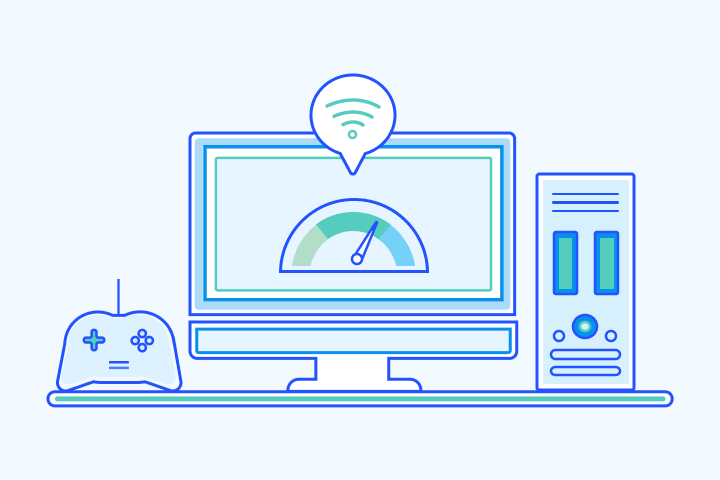Best Internet for Gaming in 2026

HighSpeedOptions prides itself on providing honest, quality content. While we may be compensated when you make a purchase through links on our site, all opinions are our own. Here's how we make money.
Table of Contents
The gaming industry has led software and hardware innovation for decades. Modern titles demand powerful systems and equally fast, reliable internet connections to deliver smooth, competitive online gaming.
Need the ultimate gaming speed?
We can help you find the best internet service in your area to take your gaming to the next level.

Ask any gamer what the most aggravating part of online gaming is, and they’ll tell you it is lag. Few things frustrate gamers more than buffering – especially when ping can determine whether or not you win the round. After low internet latency, gamers rely on internet speed to maintain their edge.
With serious gamers in mind, we’ve compiled a list of the best internet options and what to look for before you choose an internet service provider (ISP) for gaming to ensure the best experience.
Key Takeaways for Gamers:
- Fiber offers the best speeds and lowest latency for competitive play.
- Aim for at least 100 Mbps download, 100 ms or less latency, and unlimited data.
- In rural areas, Starlink is the most viable satellite option for gaming.
What is the Best Type of Internet for Gaming?
Fiber is the best type of internet connection for online gaming. It can reach speeds up to 5 Gbps, has the lowest internet latency of all internet connection types, and features symmetrical speeds. This is especially beneficial for real-time internet activities, such as competitive gaming and streaming video. The only disadvantage fiber internet presents is availability. Because it’s the newest type of internet and infrastructure costs are high, fiber is mostly available in cities and some suburbs.
Best Internet Types for Gaming (Ranked by Speed & Latency)
| Rank | Internet Type | Average Download Speed (Mbps) | Average Upload Speed (Mbps) | Average Latency (ms) | Gaming Suitability |
| 1 | Fiber | 300–5,000 Mbps | 300–2,000+ Mbps | 5–15 ms | ✅ Ideal for competitive gaming and streaming |
| 2 | Cable | 100–1,000 Mbps | 10–50 Mbps | 15–35 ms | ✅ Great for most online games and downloads |
| 3 | 5G Home Internet | 100–1,000 Mbps | 10–100 Mbps | 30–60 ms | ⚠️ Good speeds, but latency can fluctuate |
| 4 | DSL | 10–100 Mbps | 1–10 Mbps | 25–60 ms | ⚠️ Decent for casual gaming, not competitive |
| 5 | Fixed Wireless | 10–100 Mbps | 5–20 Mbps | 30–80 ms | ⚠️ Can work for solo play, not ideal for FPS |
| 6 | Satellite (Starlink) | 50–250 Mbps | 10–20 Mbps | 40–80 ms (Starlink) | ⚠️ Better than legacy satellite, but still risky |
| 7 | Satellite (Viasat & HughesNet) | 10–100 Mbps | 2–5 Mbps | 500–700+ ms | ❌ Poor for gaming due to high latency |
| Rank | 1 |
| Internet Type | Fiber |
| Average Download Speed (Mbps) | 300â5,000 Mbps |
| Average Upload Speed (Mbps) | 300â2,000+ Mbps |
| Average Latency (ms) | 5â15 ms |
| Gaming Suitability | â Ideal for competitive gaming and streaming |
| Rank | 2 |
| Internet Type | Cable |
| Average Download Speed (Mbps) | 100â1,000 Mbps |
| Average Upload Speed (Mbps) | 10â50 Mbps |
| Average Latency (ms) | 15â35 ms |
| Gaming Suitability | â Great for most online games and downloads |
| Rank | 3 |
| Internet Type | 5G Home Internet |
| Average Download Speed (Mbps) | 100â1,000 Mbps |
| Average Upload Speed (Mbps) | 10â100 Mbps |
| Average Latency (ms) | 30â60 ms |
| Gaming Suitability | â ï¸ Good speeds, but latency can fluctuate |
| Rank | 4 |
| Internet Type | DSL |
| Average Download Speed (Mbps) | 10â100 Mbps |
| Average Upload Speed (Mbps) | 1â10 Mbps |
| Average Latency (ms) | 25â60 ms |
| Gaming Suitability | â ï¸ Decent for casual gaming, not competitive |
| Rank | 5 |
| Internet Type | Fixed Wireless |
| Average Download Speed (Mbps) | 10â100 Mbps |
| Average Upload Speed (Mbps) | 5â20 Mbps |
| Average Latency (ms) | 30â80 ms |
| Gaming Suitability | â ï¸ Can work for solo play, not ideal for FPS |
| Rank | 6 |
| Internet Type | Satellite (Starlink) |
| Average Download Speed (Mbps) | 50â250 Mbps |
| Average Upload Speed (Mbps) | 10â20 Mbps |
| Average Latency (ms) | 40â80 ms (Starlink) |
| Gaming Suitability | â ï¸ Better than legacy satellite, but still risky |
| Rank | 7 |
| Internet Type | Satellite (Viasat & HughesNet) |
| Average Download Speed (Mbps) | 10â100 Mbps |
| Average Upload Speed (Mbps) | 2â5 Mbps |
| Average Latency (ms) | 500â700+ ms |
| Gaming Suitability | â Poor for gaming due to high latency |
Best Internet Providers for Gaming
For the best gaming experience, these providers offer the best availability, equipment, and speeds to accommodate even the most demanding games, like massively multiplayer online (MMO) games.
Bottom line: The faster your internet speed and the lower the latency, the better and more rewarding your online gaming experience will be.
Frontier: Best Fiber Internet for Online Gaming
Frontier internet is fast, featuring speeds between 500 Mbps – 5 Gbps and unlimited data at competitive pricing. It also has some of the best ping rates at 15 milliseconds compared to other internet providers. Frontier is ideal for gamers, though availability depends entirely on your location.
- Fiber & DSL provider
- WiFi router included
- Unlimited data included
Xfinity: Fastest Cable Internet Speeds for Gaming
Xfinity internet plans provide ultra-fast cable internet in 40 states, offering no-contract options and impressive download speeds that are ideal for gaming. One thing to note about cable internet providers is that while latency is low, it can fluctuate during peak usage times.
Additional Xfinity perks include customizable plans, advanced WiFi equipment, and symmetrical speeds up to 3 Gbps. Xfinity has monthly data caps of 1.2 TB, but for an additional monthly charge, you can upgrade to unlimited data.
- Same-day installations
- 22+ million free Wi-Fi hotspots
- Unlimited data available
AT&T: Best 5G Home Internet
AT&T 5G Home Internet delivers download speeds up to 1 Gbps, depending on location and network conditions. Latency averages 30–60 milliseconds, which is sufficient for most casual and mid-level online gaming. For gamers in areas without fiber access, AT&T’s 5G service offers a solid combination of speed, broad availability, and no data caps, making it capable of supporting smooth gameplay and HD streaming.
EarthLink: Best DSL Internet for Online Gaming
EarthLink offers robust DSL internet plans with speeds sufficient for online gaming. The provider also has a great presence in rural areas, delivering reliable internet where few options exist. EarthLink’s DSL service can reach speeds up to 75 Mbps, with faster speeds possible depending on location. EarthLink also offers wireless home internet and fiber plans with various data plans.
Starry: Best Fixed Wireless Internet Speeds for Gaming
Starry internet offers fixed wireless internet plans with speeds 300 Mbps and faster. For fixed wireless, this is a respectable speed for online gaming. More impressive is the reasonably low latency, averaging 20.3 ms. Starry keeps things simple: no data caps, no equipment fees or costs, and free installation. Additionally, Starry promises upload speeds of up to 50 Mbps or more for plans of 100 Mbps download speed or faster.
- 5G Fixed Wireless Provider
- Contract buyout up to $200
- Pause or cancel anytime for free
Starlink: Best Satellite Internet for Online Gaming
Satellite internet is generally not a good option for gaming. Since the signals have to travel so far (to orbiting satellites and back), it is prone to slow speeds and high latency. Starlink is an exception. Using an array of Low Earth Orbit (LEO) satellites, Starlink can provide speeds up to 200 Mbps and latency between 25-45 ms. For gamers in rural areas where satellite internet is often the only option, Starlink offers the best performance among satellite providers.
- High-speed satellite internet
- Low-latency connection
- No annual contracts
Finding the Best Internet for Online Gaming
Many internet plans can handle online gaming, but fiber is the top choice for its unmatched speeds, generous data allowances, and ultra-low ping. For serious gamers or those streaming in HD or 4K, choosing a higher-tier fiber plan can deliver a noticeably smoother experience.
For quick reference, you’ll want to pick an internet plan that provides:
- At least 100 Mbps download speed
- Maximum latency of 100 milliseconds
- Unlimited data
Have a look at our resource on the best speed for online gaming for in-depth information about the minimum speed requirements by game type and gaming platform.
Frequently Asked Questions About Types of Internet for Online Gaming
Fiber internet is the best option for online gaming because it offers the fastest speeds, symmetrical upload and download rates, and the lowest latency—typically 5–15 milliseconds. These features make it ideal for competitive play and smooth streaming.
A ping (a measure of internet latency) of 20 milliseconds or less is excellent, 20–50 ms is good for most online games, and anything over 100 ms can cause noticeable lag.
A minimum of 25 Mbps download speed is enough for casual play, but competitive gamers or those streaming in HD/4K should aim for 100 Mbps or higher. Check out our comprehensive guide about online gaming speed.
Yes, 5G home internet can be good for gaming, with speeds between 100–1,000 Mbps and latency averaging 30–60 ms. However, performance can fluctuate based on signal strength and network congestion.
Traditional satellite internet is not ideal for gaming due to high latency (500+ ms). Starlink, which uses Low Earth Orbit (LEO) satellites, offers lower latency (25–45 ms) and higher speeds, making it the most viable satellite option for gamers in rural areas.
Yes. While download speed affects game updates and streaming quality, upload speed impacts how quickly your actions register in online play. An upload speed of at least 5 Mbps is recommended for smooth gameplay.
Use a wired Ethernet connection instead of Wi-Fi, close background apps using bandwidth, connect to servers closer to your location, and choose an ISP with low latency and consistent speeds.
Jitter measures the variation in packet delivery time. High jitter can cause inconsistent gameplay and lag spikes. For gaming, jitter should ideally be under 20 milliseconds.
Find providers in your area

Table of Contents











